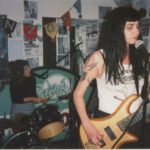I met Living Body while on their album launch tour promoting their debut LP Body Is Working, where Jeff T. Smith (Juffage) and Tom Evans (Vessels) have been joined by Alice Rowan (of Mayshe-Mayshe) and Sarah Stratham (Esper Scout), in lieu of Katie Harkin (Sky Larkin, Sleater-Kinney) being otherwise indisposed. They’d just played a gig as part of the monthly Endless Window gig night in Newcastle (alongside Glaswegian shoegaze group Life Model, noisy lo-fi band Japanese TV Club and ambient-drone experimentalist Chlorine), and sat down to a long chat in the front room of Stuart Walkinshaw, one half of semi-experimental post-rock and electronic outfit Ten Sticks.
The sheer variety of artists mentioned in that list alone gives an idea as to the type of ambitious scope Jeff has aimed for on Body Is Working. Intricate and masterfully pieced together, it combines a variety of genres (including post-rock, indie and folk) without ever once feeling disjointed or unfocused. There’s even a few surprising sounds on the record. Jeff told me about using woks and empty butter cartons for their particular sound, and he’s currently on the hunt for an old kids’ swirly tube toy to play (he says he’ll make Alice play it live, though).
On Twitter they’ve also embraced the term “post-Brexitcore” as a sort of genre, reflecting how many of their lyrics have been interpreted as a comment on recent world events. There’s certainly some elements of that in there; ‘Declaration of Independence’ has the line “rest assured I won’t vote for you,” while ‘Closer’ comments that “I know it’s so hard/ To say what you mean,” a possible jab at “post-truth society.” Or maybe not… The joy of much of Living Body’s work is that while it does seem to resonate with our current times, much of it is also open to personal interpretation.
Here, we talked about how Living Body went from a one off-gig in Leeds to a full-blown band, the search for mood, if talent (musical or otherwise) actually exists and, of course, a few current affairs.
You got together in the band as a one-off gig a couple of years ago, but why did you decide to stick together?
Jeff T. Smith: That was still a bit of a one-off gig, I suppose. Tom and I stuck together and Katie [Harkin] and I stuck together, although she’s touring at the minute. We got together after the concert and made the record, basically. I think we stuck together because for that concert all the songs were basically completely new. I wrote them for the gig and the space, which was a huge cathedral in Leeds. The first idea when I was originally going to do it solo was to have this ambi-sonic thing with a load of speakers, a big droned out thing. But Katie called me saying she wanted to play in the concert, and then I thought it’d be good to get some more people. So I got Tom and Jen, who’s on the record. So the gig happened, and we just started recording them. It didn’t feel like a Juffage record anymore, it was pretty obvious we were a band.
It’s been said that the lyrics of the record relate well to recent events from this year, but were all of the songs on the LP actually older than that?
JS: ‘Don’t Give Up On Me’ [a cover of the Empress song, and Living Body’s first single] was from the mid-to-late-nineties.
Tom Evans: It’s not on the record though!
JS: [Laughs] No, it’s not on the record but that’s the original post-Brexitcore song. But none of the songs on the record were written this year, but it’s not like there wasn’t anything to be politically disenfranchised about before two years ago! A lot of the older stuff was probably influenced by the aftermath of the Bush years. It takes me a long time to finish things, I mean [the Juffage LP] Semicircle came out in 2011. Hopefully the next record takes less than six years!
The record embraces a few different genres, and I thought it might have been because you were all from different bands. But was it really an intentional decision to be diverse?
JS: Well, I basically wrote all of it. And then I just looked for good people. Everyone in the band is involved in so many other things, and this is my main thing. It’s diverse but it flows together really well. I wrote all the songs at different times and I wasn’t trying to have a specific aesthetic but at the end I realised it pretty diverse sounding.
Alice Rowan: I really love that about it though. I’ve listened to it so often now and I’m still not bored of it yet.
JS: Well, the default setting on Spotify is shuffle, and if you listened to the record on shuffle it would be less than half as good because it just wouldn’t work. It has this perfect pacing.
TE: This is the thing with records. The contour of the album as a single work of art is important and people genuinely agonise about the track orders. You wouldn’t put the outro at the beginning of a song, so you wouldn’t put the last song on the record first.
JS: I can see why people might be a bit confused by the record if they’re skipping around it a bit though.
Sarah Statham: As a musician coming to the record after the fact, my main instrument is the drums and that had fallen by the wayside a bit while playing guitar and singing. But then when he asked me to do this and play with a stand up drum kit, I’ve had to get into Jeff’s shoes in a way and it’s taught me so many things that I’d never tried or thought about before.
AR: Yeah, with me it pushed me to sing in a totally different way and it’s been a great learning experience. With everything else I sing, it’s my own music that I write for myself, and with that you tend to either stay in a certain style or develop quite slowly, being in your comfort zone. But when you’re trying to perform someone else’s songs, especially when you’re working with someone like Jeff who’s very deliberate with the way he wants things to be, it’s a really unique and great experience.
TE: He just asked me to play guitar! I don’t play guitar in Vessels anymore, I just play synths, which is cool but my first instrument is guitar.
SS: I’m trying not to be a cliché but I am going back to my roots, and I’m out of my comfort zone!
It’s pretty impressive that you all play such a wide variety of instruments.
JS: Music is for everyone, if you don’t think you’re particularly talented then it’s because you haven’t played enough music.
AR: I don’t believe in talent. I just think that if you spend enough time on something then you can eventually master it, regardless of if you started when you were younger or not.
SS: Passion and talent are two different things. If you get home and see a guitar and think “I really want to play that for two hours,” that’s not talent, that’s just really, really being into playing the guitar. Sometimes I feel sad when you hear people tell you that you’re so good that it deters them from wanting to play. That’s the opposite of what I want! I want to inspire other people!
JS: I feel like The X Factor is partly to blame for that, as if the talent is in you and it’s very much about wanting something now. The X Factor is like the Brexit of music.
AR: Being an art teacher, this idea of having an innate ability in anything can be really damaging to young people, and older people too. People come into my classes and they’ll say “I can’t draw this” or “I’m not going to try because I can’t do it.” There is this idea that creative ability is something you have or don’t have, and it’s not true, it’s something you can nurture through trying and practicing and learning.
Despite the songs on the LP being written well before Brexit, you’ve really adopted the “post-Brexitcore” stance, so are there any songs specifically about Brexit in the works?
AR: I think that ‘Cream’ is linked to it.
JS: Yeah, ‘Cream’ is more about neo-liberalism.
TE: It’s the newest song, we’ve been playing it in our sets.
JS: It’s about capitalism really.
AR: Which is definitely linked to Brexit.
JS: It’s about the things that capitalism values over what humanity values.
I noticed a couple of your lyrics in your songs could be seen as calling out the nature of what we’ve called the “post-truth society.” What do you think about the apparently “post-truth” world that we’re living in now?
JS: It’s interesting because everything is being recorded all the time now, and you can go back and prove that things that people have said isn’t true, but it doesn’t seem to matter.
TE: I was watching something about the Presidents and how that in the 1800’s, you could say that your political opponent was dead, but because nobody knew that they were dead or not, they would vote for the other candidate. But now we have absolute coverage of everything, yet it seems like it makes even less difference.
SS: I heard a good point that now it’s more about who’s the quickest rather than who’s the most accurate, so it’s about who’s got better clickbait.
JS: It’s literally about clickbait, which is why good news outlets are failing. There’s a whole internet out there filled with pictures of cats but no actual news journalism because no one has time to read or even research things. Breitbart has a lot to do with what’s happened in the States. It makes FOX News look like Democracy Now.
SS: I think that just makes the point even more, that in hindsight, this information was allowed to be there but looking back it’s like “oh no, how did this happen?” So, getting back to the musical aspect, how can we use this to better our band?
TE: [Laughs] Hopefully not that everyone thinks Living Body are amazing, but only twelve years down the line!
JS: It’s funny because I’ve never really intended the songs to be deliberately political, it’s more about trying to understand the world and your place in it than “who’s a Tory.”
That’s interesting because it’s like you don’t aim for a message but more of a mood.
JS: Music can mean so many things to so many people, and I’m not deliberately trying to be ambiguous, but I often don’t know what a song is about until I’ve finished writing it. I concentrate more on the melody, the melody for me is probably the most important thing for me. It’s all about serving the melody and the hook. So because of that the lyrics aren’t super direct or particularly story-telling. People can attach their own meaning to it, and people are politically frustrated at the minute, so they seem to be interpreting it as such.
I guess if you did talk about something really specific as well, it might also really date the songs or the album as a whole.
TE: You can counter-truth it as well! It’s a difficult one because music has a really important role to play in society in terms of being a catalyst for change and informing opinions. But say, Rage Against The Machine were one of the first bands to be overtly political and not be cringe-worthy – I’ve seen loads of bands try and be overtly political but it’s just turned out dated. Radiohead do it really well though, because it’s more of an existential and metaphysical take and you get the feel of the tune.
SS: That happens with me too, as I’m clearly influenced by happens in life but the music is what I begin to shape. Then a year later I’ll go “oh, that’s what I was talking about!” I speak about it in a more conversational way and it’s interactional.
JS: It’s the same with the gigs. A lot of people go to gigs and they think that it’s a one-way interaction. But really we’re having a two-way conversation in a gig, we’re in this together. Things are so dependent on context, basically. In a way it’s like, if you don’t say anything then who’s going to? I never used to think of the band as political but now it’s like, shit, why shouldn’t we be?
For a second record then, would you intentionally bring those themes more to the forefront?
JS: It’s funny because I always had an idea and some themes for the record before this one was already done, and it was to do with our relationship to capitalism and our work-play balance. Maybe it will be a little bit less open to interpretation. I think the subject matter of this record is more about wishing things are different, wishing I had more time. Not necessarily protest music.
SS: I think a lot of people associate political music with something like punk, but I think our music is a lot more colourful and just a bit more flowing and delicate. The ethics and the attitude are punk but musically it’s not really like that. The sound and tone of the music can represent how it’s so integrated into everyday life.
AR: Protest isn’t the only political action either, compliance is as well.
TE: There’s a legitimacy about angry protest music, but that doesn’t mean it’s the only music that can make a statement about something.
JS: I do like how all these conversations have been opened up by the record. These things need to be talked about anyway, so it’s good.
Living Body’s debut album Body Is Working is out now. Read our 8/10 review of Body is Working here.




